How to communicate your authenticity in an interview
One of the aspects of my job that I particularly enjoy is interviewing leaders. Having interviewed over 4,000 educational leaders, nationally and internationally, I have been reflecting on the qualities that set some leaders apart. As educational leaders, we navigate through an ever-evolving educational landscape where we are expected to guide, inspire, and influence those we serve. Central to fulfilling these roles effectively is authenticity in leadership. Authenticity stems from a deep-seated commitment to values such as humility, honesty, integrity, and purpose. These are the character qualities that inspire trust and foster a positive learning culture. So how is it possible to convey these qualities during an interview?
Relational: Putting People First
Authentic leaders invest in relationships, listening and seeking to understand fully, asking clarifying questions as necessary before conveying their own opinions and making decisions. They embrace diversity and inclusivity, recognizing the value of different perspectives and experiences. Even many experienced leaders can be nervous during interviews, it is authentic to acknowledge this, a skilled interviewer has sensed this anyway. Breathe, build a rapport with the interviewer, taking your time to clarify what is being asked. Too many candidates rush their answers as if completing an assignment or present pre-prepared answers. Authentic leaders model their emotional skills by demonstrating this with the interviewee or members of the panel.
Humility: The Hallmark of Authentic Leadership
Leadership and humility may seem contradictory, but I believe they are inseparably intertwined. Humble leaders recognize their strengths, but are also aware of their limitations. They are open to learning from others, willing to admit mistakes, and quick to share credit by acknowledging the efforts of a team. By modelling humility, educational leaders learn to utilise the strengths and knowledge of those around them and readily seek advice from a range of stakeholders. Humility also breeds empathy, fostering a compassionate and supportive environment conducive to collective growth. Too often in an interview situation – over confidence can present as hubris, and a lack of self-awareness in claiming credit for leading initiatives and programs that must almost by definition if they are of any significance, have involved the input and contribution of others.
Honesty: Building Trust Through Truthfulness
Honesty is the cornerstone of any relationship, and it’s no different in a leadership context. Honesty encourages a climate of trust and respect. Leaders who exhibit honesty in their communication and actions help cultivate an environment where everyone feels heard, valued, and respected. Honesty begins with being true to yourself and extends to all interactions. In an interview, don’t exaggerate your accomplishments or claim skills you don’t possess. Instead, focus on your genuine experiences, the challenges you’ve faced, and how you’ve overcome them, and importantly – what you have learnt about yourself through the experience. An honest self-assessment, coupled with an authentic portrayal of your career journey, fosters trust and demonstrates your character. If you cannot provide an example at the level of leadership required, be honest about this and then outline strategically what you would do or how you would approach the situation when successful in the role.
Personal Transparency: Enhancing Accountability and Shared Understanding
When leaders are transparent, they strengthen accountability, promote understanding, and build trust within the school community. Transparency in educational leadership ensures everyone is on the same page, contributing to a shared vision of the institution’s goals and strategies. It also creates a culture of openness that encourages creativity, innovation, and collaboration. Transparency in an interview involves being open about your career goals, values, and principles. It means in an interview that you are NOT presenting as more interested in the title of the role and how you can personally gain from this position, but rather, are focusing on the actual impact, purpose and commitment to the school’s cultural values. Leaders who openly share feedback from recent 360-degree reviews, or can deeply reflect on how they have implemented feedback to change an approach in their leadership are demonstrating transparency.
Integrity: Leading by Example
Integrity is the embodiment of consistency in values, actions, principles, expectations, and outcomes. Leaders with integrity walk their talk, modelling the behaviours and values they wish to see in their students and staff. Integrity reflects your consistency between words and actions. In your responses, highlight instances where you’ve upheld your values, even when faced with challenges. Discuss situations where you’ve taken a stand, upheld ethical practices, or led by example, sometimes even to your own personal detriment. In my view it is not possible to have a different set of values in the school, or broader educational environment to those you hold in your private life. It is nuanced but sometimes it is appropriate and can be quite powerful to draw on your out of school life when responding to a values question.
Purpose: Inspiring Through Vision
Authentic leaders have a clear sense of purpose that transcends day-to-day operations and even the boundaries of that particular role or school setting. Purposeful leaders don’t just manage; they inspire and motivate. They articulate a compelling vision that connects the daily work of teachers and students to larger, meaningful outcomes. A purpose-driven leader helps everyone in the school community to understand the “why behind the work”, fostering a sense of belonging and commitment that can dramatically improve the learning environment. In an interview, articulate your purpose by sharing what drives you, why you are drawn to leadership, and how you envision your role in the organization’s future.
Conclusion
Authenticity in leadership fosters an environment of trust, respect, and shared purpose. It builds resilient school communities, ready to face challenges and embrace opportunities. By focusing on building relationships and leading with humility, honesty, transparency, integrity, and purpose, educational leaders not only inspire their students and staff, they create a lasting legacy that impacts generations to come.
About the author:
Fiona Hutton is the Founder & Managing Director of Hutton Consulting Australia.

Recent Posts
LEADREAD 3: Invisible labour: Principals’ emotional labour in volatile times

LEADREAD 2: Executive Functions Conceptual Framework and Relevance for Education

Leading and Learning: Insights from Principals

Leading & Learning: Insights from Principals

LEADREAD 1: Portrait of a Leader
